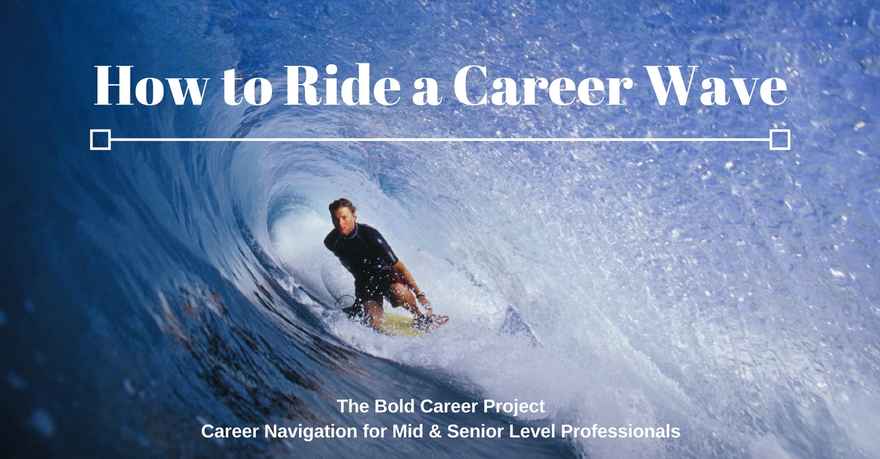Career Coaching & Career Advice Blog
The articles you need to create
a successful and fulfilling career journey.
How to Ride a Career Wave - with 1 page PDF worksheet

Many professionals and executives have made a significant step in their career or even changed the trajectory of their career thanks to riding a wave. While it can happen accidentally, paying attention to your environment can significantly increase the likelihood of catching your next industry wave. Learn how to ride a career wave.
What is an Industry Wave?
Nothing more than a ripple far from shore, a wave slowly begins to pick up energy and size. The art of surfing is to spot the right wave, catch it at the right time and then learn how to ride it until the time is right to step off. In a professional sense, waves are forming and mounting all of the time. Every industry and profession experiences emerging and growing areas of interest, priority and requirements that might include demand for specific experience, knowledge or expertise. By their definition, industry waves are characterized by scarcity and for a period of time, demand that exceeds the supply of talent. Indeed, a significant portion of work awarded to recruiting firms is to find people with these rare and new sets of capabilities.
Understanding Professional Opportunity and Waves
There are three waves you can “catch” that could positively impact the trajectory of your career. Experience-based: As industries and markets evolve, companies look to bring in a veteran of a new or rare set of experience. For example, a hot, new emerging international market would create demand for managers with experience doing business in that country. Knowledge based: New regulatory standards, significant evolutions in a profession, changes in technology or the emergence of management fads are examples of emerging demands for experts. Skill base: Similarly, the emergence of new skills or increasing demand for existing skills creates a wave opportunity. Examples would include the rapid adoption of a coding language or the now common requirement that managers have competency in coaching employees. The worksheet can help you think about and identify what's coming in your world.
The Advantage of Being Early
There can be significant advantages to anticipating and riding a wave early in its cycle.
There is usually a lower bar to entry early in the wave. Because the thing in demand is either new or scarce or both, there is less competition and standards haven’t necessarily been created.
Less competition for jobs and assignments means more opportunity to make stronger career moves
And in many cases, because this is a wave, jobs and assignments might be high profile and lead to opportunities for exposure and promotion
One of the great advantages of catching a wave early is that you get to learn and get stronger as you go. The force of the wave might generate investment by companies in training, creation of new jobs and resources.
Which means that you might be an established expert, taking on higher level jobs or even moving onto the next thing while others are still getting in.
How to Catch a Wave
By far, the most common way is by accident. Your experience, knowledge or skills become valuable after the fact that you’ve acquired them. So, the first step in trying to engineer a wave move is to look at your professional assets and compare them to what’s in demand, or likely to be in demand in the future. The second way is to make educated guesses about where your industry and profession is going and selectively take steps to increase your exposure in that area. If it’s experience, it might mean making a career move to get that experience, or seeking projects or assignments internally. For expertise and skill based waves, it might mean investing time and money in courses, self-study and other forms of training and reading. It could also involve finding ways to acquire that knowledge and practice those skills on the job, again internally or through a career move.
Download
I’ve put together a simple 1-page worksheet to help you identify and define what career wave opportunities might exist for you in your industry. Click to get your copy of the Career Wave Finder worksheet.
